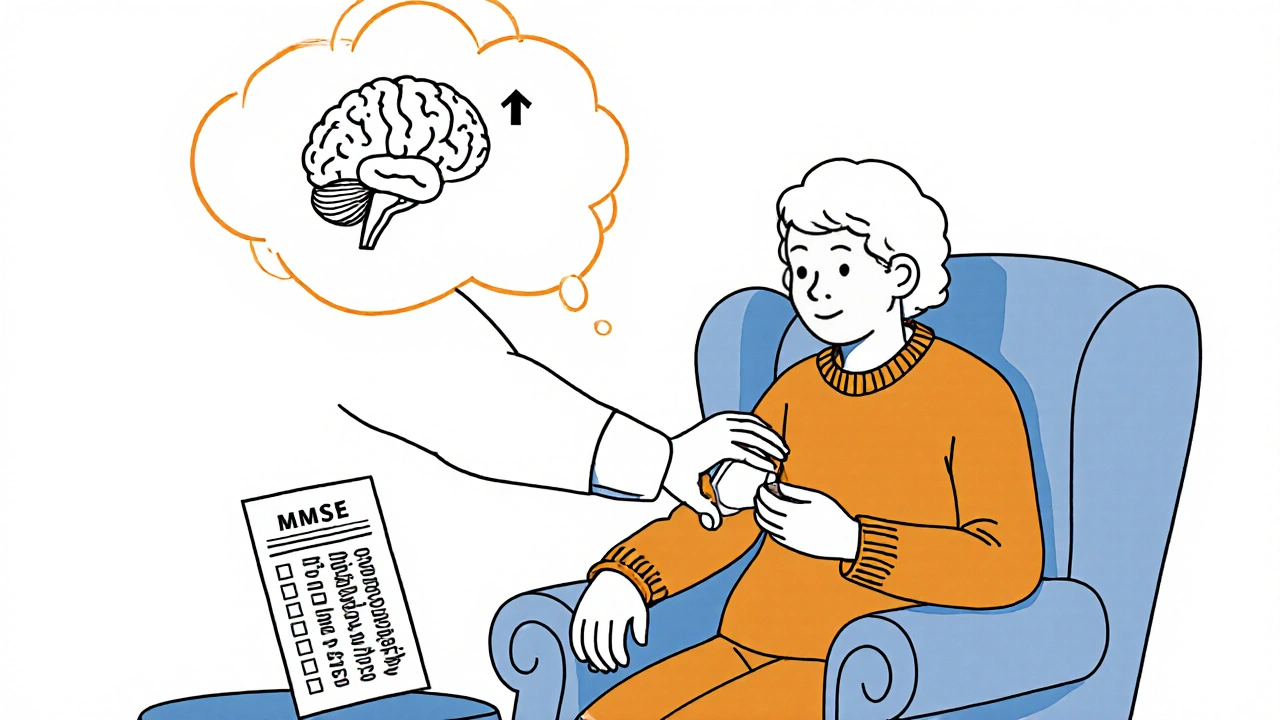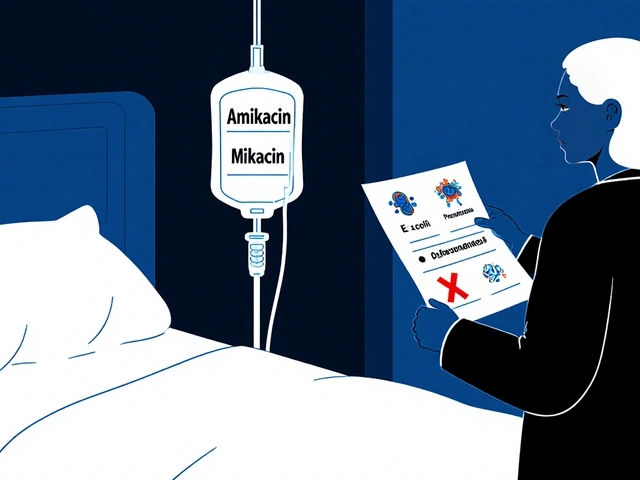Key Takeaways
- Exelon is a cholinesterase inhibitor approved for mild‑to‑moderate Alzheimer’s disease and Parkinson’s‑related dementia.
- Donepezil, galantamine and memantine are the most common alternatives, each with distinct dosing schedules and side‑effect profiles.
- Choosing the right drug depends on patient age, liver/kidney function, tolerance for gastrointestinal issues, and whether a caregiver prefers patch over oral dosing.
- Combination therapy (memantine + a cholinesterase inhibitor) can provide modest additional cognitive benefit for moderate‑to‑severe cases.
- Regular monitoring with tools like the Mini‑Mental State Examination (MMSE) helps gauge efficacy and decide when to switch.
What Is Exelon (Rivastigmine)?
When you see the name Exelon is a brand‑name formulation of the drug rivastigmine, a reversible cholinesterase inhibitor used to treat dementia associated with Alzheimer’s disease and Parkinson’s disease. It works by boosting acetylcholine levels in the brain, which helps nerve cells communicate better. Exelon is available as a daily oral capsule and as a transdermal patch that releases the drug over 24 hours, which can be a game‑changer for patients who struggle with swallowing pills.
Why Compare Alternatives?
Alzheimer’s isn’t a one‑size‑fits‑all condition. Some patients tolerate the patch well, while others experience nausea from the oral capsule. Cost, dosing frequency, and side‑effects all play a role. By laying out the main alternatives side‑by‑side, you can spot the trade‑offs that matter most for you or a loved one.
The Main Players in Alzheimer’s Pharmacotherapy
Beyond Exelon, three other prescription drugs dominate the market:
- Donepezil - another cholinesterase inhibitor, sold under the brand name Aricept.
- Galantamine - cholinesterase inhibitor marketed as Razadyne.
- Memantine - an NMDA‑receptor antagonist sold as Namenda, usually added to a cholinesterase inhibitor for moderate‑to‑severe disease.
All four belong to the broader class of cholinesterase inhibitors, except memantine, which works through a different mechanism.
Side‑Effect Profiles at a Glance
| Medication | Class | Typical Dose | Common Side Effects | Key Advantage |
|---|---|---|---|---|
| Exelon (Rivastigmine) | Cholinesterase inhibitor | Patch: 4.6 mg/24 h; Capsule: 1.5‑6 mg BID | Nausea, vomiting, skin irritation (patch) | Patch avoids daily swallowing |
| Donepezil | Cholinesterase inhibitor | 5‑10 mg daily | Dizziness, insomnia, GI upset | Once‑daily dosing, long‑term safety data |
| Galantamine | Cholinesterase inhibitor | 8‑24 mg BID | Weight loss, constipation, hepatic enzyme elevation | Higher selectivity for brain cholinesterase |
| Memantine | NMDA‑receptor antagonist | 10‑20 mg BID | Dizziness, headache, constipation | Useful in moderate‑to‑severe stages, can combine |
How to Choose the Right Medication
- Assess disease stage. For mild‑to‑moderate Alzheimer’s, any cholinesterase inhibitor (Exelon, donepezil, galantamine) works. Once symptoms become moderate‑to‑severe, adding memantine often yields extra benefit.
- Check comorbidities. Liver disease favors Exelon’s patch because the oral capsule is metabolized hepatically. Renal impairment pushes toward donepezil, which has minimal renal clearance.
- Consider side‑effect tolerance. If a patient has chronic nausea, the patch may be smoother. If skin irritation is a concern, oral donepezil may be safer.
- Review cost and insurance. In the UK, the NHS typically prefers donepezil as first‑line due to price, while Exelon may need special authorisation.
- Factor in caregiver convenience. Once‑daily dosing (donepezil) or a once‑weekly patch change (Exelon) reduces administration errors.
Talk to a neurologist or geriatrician for a personalized plan. They’ll often order baseline labs (liver enzymes, renal function) and a cognitive baseline using the Mini‑Mental State Examination (MMSE) before starting therapy.
Real‑World Scenarios
Scenario 1: The pill‑averse patient
Mrs. Green, 78, has early Alzheimer’s but struggles with dysphagia. Her doctor switches her from donepezil capsules to the Exelon patch. After two weeks, her MMSE score stabilises, and her caregiver notes fewer missed doses.
Scenario 2: The sensitive stomach
Mr. Liu, 70, experiences severe nausea on oral rivastigmine. Switching to donepezil resolves the GI upset, and his cognition remains steady for eight months before a switch to add memantine when the disease progresses.
Scenario 3: Combining for moderate disease
Ms. Patel, 73, is on donepezil but shows rapid decline. Adding memantine results in a modest 2‑point MMSE improvement over six months and slows functional loss.

Regulatory and Safety Notes
All four drugs have FDA approval (and UK MHRA endorsement) for Alzheimer’s. However, off‑label use-such as using Exelon for Lewy‑body dementia-requires careful risk‑benefit analysis. The FDA label for rivastigmine warns about potential cardiovascular effects, especially in patients with pre‑existing arrhythmias.
Regular monitoring includes:
- Baseline and quarterly liver function tests for Exelon (especially oral form).
- Blood pressure and heart rate checks for all cholinesterase inhibitors.
- Annual cognitive assessments (MMSE or MoCA) to gauge progression.
Bottom Line: Which Drug Fits Your Situation?
Here’s a quick cheat‑sheet:
- Exelon patch - Best for swallowing difficulties, steady drug levels, but watch for skin reactions.
- Donepezil - First‑line for most patients in the UK, once‑daily, good safety record.
- Galantamine - Consider if you need a higher brain‑selective inhibitor and can manage twice‑daily dosing.
- Memantine - Add to any cholinesterase inhibitor for moderate‑to‑severe disease or if cholinesterase side‑effects limit dosing.
Always involve a healthcare professional before making changes. The right choice evolves as the disease progresses.
Frequently Asked Questions
Can I switch from Exelon to another drug without a washout period?
Yes, most clinicians transition directly, but they often taper the dose over a week to avoid abrupt cholinergic changes. Always follow your doctor’s taper schedule.
Is the Exelon patch more expensive than oral medication?
In the UK, the patch can be pricier, and the NHS may require special approval. Private insurance often covers it if there’s a documented swallowing issue.
What should I do if I develop a rash under the Exelon patch?
Remove the patch immediately, clean the area, and contact your prescriber. They may lower the dose, switch to the capsule, or try a different cholinesterase inhibitor.
Can memantine be used as a stand‑alone treatment?
Memantine is approved for moderate‑to‑severe Alzheimer’s, but clinical guidelines recommend it alongside a cholinesterase inhibitor for best results.
How often should cognitive testing be done while on these meds?
Every 3-6 months is typical. Frequent testing helps catch rapid decline, prompting a medication review.
Next Steps for Patients and Caregivers
1. Schedule a medication review. Bring a list of current drugs, recent lab results, and any side‑effects you’ve noticed.
2. Ask about dose‑adjustment protocols. Knowing the taper schedule prevents withdrawal symptoms.
3. Set up regular cognitive check‑ins. Use tools like MMSE or MoCA to track progress.
4. Consider non‑pharmacologic support. Exercise, social engagement, and diet (Mediterranean style) complement any drug regimen.
5. Stay informed. New formulations (e.g., once‑weekly patches) are in development, and clinical trials may offer early‑access options.
Choosing the right Alzheimer’s medication isn’t a one‑time decision-it’s an ongoing conversation between you, the patient, and the healthcare team. With the right information, you can steer that conversation toward the best possible outcome.




Comments
13 Comments
Chirag Muthoo
I appreciate the thorough comparison presented. The article correctly highlights the importance of baseline laboratory assessments before initiating rivastigmine therapy. Monitoring liver enzymes periodically, especially when the oral formulation is used, is a prudent clinical practice. Additionally, the discussion of caregiver convenience in relation to dosing frequency is valuable. I hope readers find this information useful in shared decision‑making.
Casey Cloud
Exelon and its generic rivastigmine offer a transdermal option that avoids the gastrointestinal side effects associated with oral cholinesterase inhibitors. The patch provides steady plasma concentrations over a 24‑hour period which can improve adherence in patients with dysphagia. However, the cutaneous reaction rate is not negligible and clinicians should counsel patients on rotation of application sites. Donepezil remains the most widely prescribed agent due to its once‑daily dosing and extensive safety data. Its pharmacokinetic profile is favorable in patients with mild hepatic impairment because it undergoes limited hepatic metabolism. Galantamine possesses higher selectivity for central acetylcholinesterase which may translate into modest cognitive benefit in select cohorts. The twice‑daily dosing schedule, however, can be burdensome for some caregivers. Memantine acts via a distinct NMDA‑receptor antagonism and is typically added for moderate‑to‑severe disease stages. Combination therapy of a cholinesterase inhibitor with memantine has demonstrated incremental gains on MMSE scores in several trials. Regular cognitive assessments such as the MMSE or MoCA are essential to gauge therapeutic efficacy and to determine the optimal timing for medication adjustments. Cost considerations also influence prescribing patterns especially in health systems with budget constraints. In the United Kingdom the NHS generally prefers donepezil as first‑line therapy because of its cost‑effectiveness. Insurance coverage for the Exelon patch varies and may require prior authorization in certain jurisdictions. Patients with significant gastrointestinal intolerance often benefit from the patch despite the potential for skin irritation. When a rash develops, clinicians should reassess the risk‑benefit ratio and consider dose reduction or switching to an alternative agent. Ultimately individual patient factors such as age, comorbidities, and caregiver preferences should drive the decision‑making process. Ongoing research continues to explore novel delivery systems and combination regimens that may further improve outcomes for persons living with Alzheimer’s disease.
eric smith
Oh joy another patch option-because what we really needed was an extra excuse for skin irritation. The article does a decent job of listing side effects but glosses over the fact that the patch can be a nightmare for patients with sensitive dermis. Clearly, the “steady drug levels” argument sounds great until you’re dealing with adhesive residue that refuses to come off.
Jasmina Redzepovic
Honestly, the United States has pioneered the most rigorous pharmacovigilance frameworks for cholinesterase inhibitors, and this piece fails to acknowledge the superiority of our FDA‑mandated post‑marketing surveillance. The pharmacodynamic profile of rivastigmine versus donepezil is well‑documented in the peer‑reviewed literature, with rivastigmine demonstrating a broader spectrum of acetylcholinesterase inhibition across both central and peripheral sites. Moreover, the cost‑effectiveness analysis presented is superficial; a proper health‑economic model would incorporate quality‑adjusted life years (QALYs) and incremental cost‑effectiveness ratios (ICERs) rather than vague statements about “price.” Finally, the suggestion that caregivers prefer oral dosing ignores the empirical data showing higher adherence rates with transdermal systems in geriatric populations.
Eryn Wells
Great rundown of the options! 🎉 It’s so helpful to see the side‑effects laid out so clearly, especially for families new to Alzheimer’s care. 😊 Remember, the best choice often depends on the individual’s lifestyle and preferences-there’s no one‑size‑fits‑all. 👍 If you have any doubts, reaching out to a specialist can make a huge difference.
Kathrynne Krause
Absolutely, the article paints a vivid picture of each medication’s strengths and trade‑offs. 🌈 For anyone juggling pills or patches, the visual comparison feels like a roadmap through a maze of choices. 🌟 It’s refreshing to see such a balanced perspective that respects both clinical nuance and caregiver convenience.
Angela Koulouris
I’m glad the piece highlights the importance of regular lab monitoring. It’s a solid reminder that staying proactive with liver function tests can prevent complications down the line. Keep the information coming; it’s a valuable resource for both patients and their support teams.
erica fenty
Interesting-concise-well‑structured-informative!
Xavier Lusky
One can’t ignore the possibility that pharmaceutical companies are pushing these drugs to maintain market dominance while downplaying long‑term risks. The article doesn’t mention the hidden financial incentives that may bias prescribing patterns.
Kimberly Lloyd
Reading this comparative review reminds me that medicine is as much an art as a science, where each therapeutic choice is a brushstroke on the canvas of a patient’s life. While the data guide us, the human element-values, hopes, and daily realities-ultimately shapes the ideal regimen. Embracing both evidence and empathy can lead to more compassionate care.
Sakib Shaikh
Let me tell ya, the stakes are hight when you pick a med for Alzheimers. If you ignore the hepatotoxic potential of oral rivastigmine you could be doin’ a disservice to the patient. The patch, while savin’ you from nausea, can cause a rash that looks like a warzone on the skin. So, weigh those options carefully and don’t just jump on the first hype train!
Devendra Tripathi
Honestly, I think the whole emphasis on drug therapy is overrated. Lifestyle interventions, diet, and cognitive training often get sidelined while pharma pushes pills. We should be skeptical of any claim that a medication will dramatically halt progression.
Nick M
Another pharma push, same old story, nothing new.
Write a comment